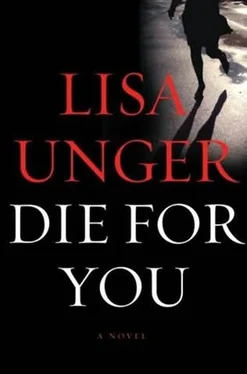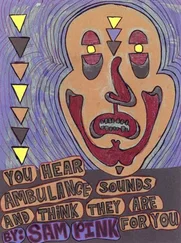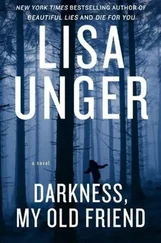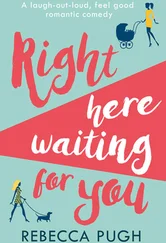“But why would she want to know that? What was she looking for in particular?”
“She wanted to know things like how often the Raines went out, did they look happy, did he bring her flowers. She wanted to know if he stayed out late, brought any other women back to the apartment when Mrs. Raine was out of town. Things like that-jealous girlfriend things.”
“And what about Raine? Did he mention the incident again?”
Shane nodded. “On the way out to work the next morning, he gave me a hundred dollars, asked that I keep what happened the night before to myself. I agreed, of course. He said he’d continue to appreciate my discretion. And he did-with money, once tickets to a play once a nice bottle of scotch.”
“So you played them both.”
He bristled. “I obliged them both. Gave them both what they wanted.”
“Like any good doorman.”
“That’s right, sir.” But his chin dropped to his chest, shoulders lost their square.
“And this woman?” Grady tapped the photo of S.
Shane nodded. “She was one of the women I let into the apartment. There were four of them. Two women, two men. I let them in and out through the service door behind the building. They came with big empty sacks. When they left, they were all full. I didn’t ask any questions or say a word to any of them. Of course, I had no idea people had been murdered, that crimes had been committed. Until you came that night, I didn’t understand what I had done. I was afraid then. I ran.”
“Was he one of them?” Grady asked, pointing to the photograph of Ivan Ragan.
Shane shook his head. “No. Him-I’ve never seen.”
Isabel Raine had given them a lot of information-the photographs from the thumb drive in Camilla Novak’s purse, addresses, Web sites, names. She’d even drawn a few connections. Authors didn’t make bad detectives, it turned out.
“What else, Shane? What else do you have for us?”
Shane shook his head. “I am paid to be of service. And I did that for the Raines. It’s not my job to ask questions or pass judgment. I just hold open the door.”
Grady just stared at him for a minute. Shane was an oddity he didn’t quite understand. Grady couldn’t stop asking questions; finding the answers drove him. Analyzing, extrapolating meaning, finding connections-it was his job, his life. Maybe he had it all wrong.
“Camilla was a good girl, I think,” Shane said. “She made mistakes, had problems. But she wanted to be good.” He was just thinking out loud, Grady thought. Shane was tired, sinking into the depression that follows too much alcohol.
“Wanting to be good doesn’t make you good,” said Jez quietly, maybe a little sadly. She was looking down at her feet. Grady thought she should spring for a new pair of shoes.
“SO WHAT ARE we thinking here?” asked Grady. They were back at their desks on the homicide floor, facing each other. It was late, most everyone long gone for the night. They were both exhausted, but the adrenaline blast from earlier in the evening still had them edgy and wired.
Jez’s desk was a study of organization-neat stacks of folders, a few photos of her son, and nothing else. Grady’s was a field of clutter-papers waiting to be filed, a box of pens spilling its contents, a crumpled white bag from some meal he’d eaten there in the last week, an old mug in which coffee had solidified and was beginning to send off an odor. He dumped the cup in the trash rather than wash it, cleared a space to rest his elbows.
Jez had a printout of Isabel’s e-mail in front of her and was reading rather than looking at Grady.
“Camilla Novak and Kristof Ragan, if that’s really his name, conspired to kill Marcus Raine and steal his money,” she said. It sounded as if she was certain. This was how they did it-came up with theories, tried to shoot them down, see if they held.
“Then how did Ragan wind up married to Isabel Connelly, running a legitmate business, leaving Camilla Novak weeping on the sidewalk outside his luxury, doorman building?”
She thought about it for a minute, tapping her pen. “He was a con. Isabel Connelly was his next mark. Somehow he convinced Novak to wait, promised her the payout would be even bigger after he’d run his con on Isabel Connelly and her family. Maybe he gave her money, continued their love affair, keeping her hope alive. But she got tired of waiting.”
Grady thought about it, about the e-mail Isabel had forwarded to him. “She started e-mailing Isabel Raine-trying to burn it down, like she threatened on the street.”
“He wasn’t supposed to fall in love with Isabel. But he did. He fell in love with her, with the life they made,” said Jez.
“He didn’t want to leave her,” Grady agreed.
“And his brother, Ivan Ragan?”
Grady already had a theory about this. “Okay. So Ivan and Kristof Ragan both come to the U.S. at the same time. Kristof is the good one, goes to college, gets a job at Red Gravity. There he meets Marcus Raine, decides he wants what this guy has-money, the girl. He enlists the help of his criminal brother-someone to do the dirty work, the kill, the disposal-for a share of the haul.”
“But at the end of the day, Kristof doesn’t want to share,” added Jez. She shifted through her file and found the arrest report for Ivan Ragan, handed it to Grady. “Ivan Ragan was arrested after an anonymous tip that he had enough guns in his home for a small army.”
“Kristof Ragan betrayed his brother, had him sent away.”
“Why not kill him? Why take the risk that Ivan would use what he knew to get off?”
Grady shrugged. “Maybe he didn’t want to kill his brother. Maybe he believed that Ivan wouldn’t betray him, wouldn’t suspect that his brother had been the one to turn him over to police.”
“But Kristof had to know Ivan would get out one day, that he’d have to pay his brother off at some point.”
“Maybe he thought he’d be long gone by then. He didn’t expect to fall in love with Isabel. This was the one thing he didn’t plan for, the thing that caused him to stay too long.”
Grady looked down at the photographs of Kristof and Ivan Ragan and the other unidentified men on the dock. “Ivan found out his brother betrayed him,” he said.
“Looks that way.”
Jez was looking down at her own set of prints, shaking her head slightly.
“Is money really that important?” Grady asked, thinking about Kristof Ragan and how he’d deceived and manipulated, stolen and killed. Ragan betrayed his own brother, shot him and left him for dead.
She raised her eyebrows. “Money is important. It’s very important.”
“So important that you sell your ethics, your morals, betray people who love you, murder?”
“For some. But I’m not sure that’s just about money.”
“What’s it about then?”
She looked down at her desk, tapped her fingers. “An idea, an image of what money is, what it brings to your life, how it defines your worth.”
He shook his head. “It’s hard to understand.”
“Is it?” she asked. “Before Benjy I never worried about money. I thought as long as I had what I needed to pay the bills, put some away for later, and have a few extras, that’s all I needed. I’ve seen those skells-pimps and drug dealers-with all their money. It bought them everything, cars and clothes, flat screens and leather couches. But they were still scum, still dirty, still nothing.”
“And now?”
“And now, there’s Benjy’s private school education and saving for college and the cost of health care, gas and groceries through the roof. And he goes to school with all these rich kids, and they have these sneakers that cost $200 and jeans that cost as much and more. Even the T-shirt he wanted? $150. I want him to have those things. I can’t always give them.”
Читать дальше












